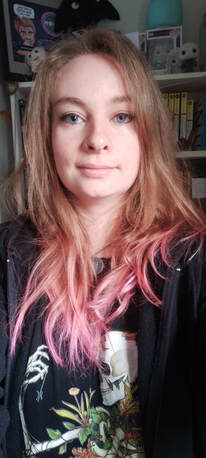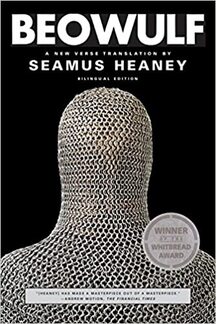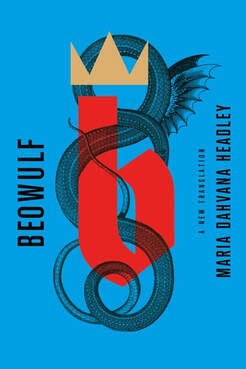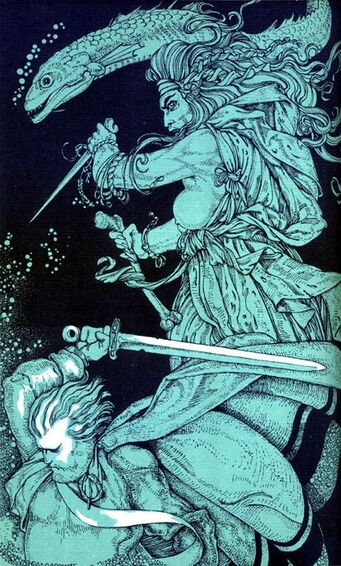Much of your academic work centers around the Anglo-Saxon legend Beowulf. What was your first encounter with this text and how did it capture your imagination as a focus of your academic career? My first encounter was in first year of undergraduate with Dr Juliet Mullins in UCC. It didn’t capture my attention too much in the beginning, but as an 18 year old who was just becoming familiar with feminism, the lectures on Grendel’s mother and the other women of the poem really caught me! For my MA I held on to this fascination with Grendel’s mother and after seeing the Robert Zemeckis film from 2007 where her character is played by a hyper-sexualized gold-covered Angelina Jolie my interest peaked and I have been hooked ever since. "...as an 18 year old who was just becoming familiar with feminism, the lectures on Grendel’s mother and the other women of the poem really caught me!" I also may add that there is a movement within medieval studies to try not to use the term “Anglo-Saxon” due to its co-opting by racists - for instance before I studied the early medieval I thought Anglo-Saxon referred to WASPs! Due to the hard work by scholars like Mary Ramabaran-Olm and Adam Miyashiro among many others, the racisms within (and without) the field are really being highlighted. Your work with the legend Beowulf involves both translation and critical analysis of fiction inspired by it. I myself and a writer who strives to ‘reclaim and reframe’ the Norse Myths which have been very problematically debased over the past century in particular. What is the framework or approach you take to analyzing adaptations of Beowulf? What are some common problems and ways, perhaps for those who are working on their own adaptations, to avoid major pitfalls? I generally approach translations and adaptations of Beowulf through a theoretical framework, usually feminist or post-colonial, but also through a psychoanalytical framework too, whether that be Freudian, Lacanian, or Kristevan. My approach is often influenced by the cultural context from which the work comes, so for those awful 90s and 2000s films that came out around the time of third wave feminism (and are often backlashes against it), a feminist lens is often the best approach. For Heaney’s translation, which was written by a Northern Irish man shaped by the conflict in the North, a post-colonial approach is really fruitful. I am a firm believer in thinking that all translations and adaptations have something to offer, and I do try to be as unbiased as possible, taking a post-structuralist, Derridian approach to the idea of textual hierarchy - these texts should be judged in their own right, rather than in a comparative fashion. I think major pitfalls are generally just pitfalls that any novel or creative text would fall into. Perhaps with adaptations there is the temptation to fall back onto the poem and let the original carry the work, and I generally feel that those that try to be a bit more experimental (like John Gardner’s Grendel, Michael Crichton’s Eaters of the Dead, and film-wise Howard McCain’s Outlander) are more enjoyable. "I am a firm believer in thinking that all translations and adaptations have something to offer, and I do try to be as unbiased as possible, taking a post-structuralist, Derridian approach to the idea of textual hierarchy - these texts should be judged in their own right, rather than in a comparative fashion." I’ve got to ask this as I’ve just finished reading Maria Headley’s brand new translation of Beowulf. What was your impression? What do you think it adds to the current selection of English translations on bookshelves today? And were there any translation decisions for which you would have taken a different direction? I am currently in the process of reading this translation myself, so I cannot make the most rounded opinion as of yet! Saying that, I so far have a mixed to positive response - I love the poetic language Headley uses, I find it so rich and beautiful to read. However, I am on the fence with the slang terms, as, while they make it a very contemporary translation, I can’t help but feel that some may become a bit passé a bit quick (e.g. “hashtag: blessed”). Of course, any translation that is a bit experimental and a bit different is a welcome translation in terms of its value as a rereading, and as a woman, it is great to see such a popular translation by Headley. It is in translations’ differences that make them the most interesting, and Headley’s, while I wouldn’t use it as a primary translation in terms of teaching, I would definitely use it as a means to showcase the reception of Beowulf and as a comparative work amongst a selection of translations. I also feel that it is a great text to make the poem more accessible and fresh and it will hopefully encourage a greater interest in Old English and other medieval texts! "It is in translations’ differences that make them the most interesting..." Another theme I notice both in your work and on your social media is reflections on the continuing development, however glacially slow, of a public conversation on the crisis of violence against women. What issues does Beowulf as a text raise for you on this topic and how do you feel like the academic discourse around Beowulf might contribute to the public discourse? I think Beowulf really exposes a society where there was a fear of female strength - we see this in the figure of Modthryth, whose power is used and abused and viewed with some amount of fear. Of course, more obviously we see it with Grendel’s mother, and I think Renee Trilling’s article “Beyond Abjection: The Problem with Grendel’s Mother Again” is a great theoretical analysis of the poem’s and the characters within it’s treatment of her character. She is numerous times referred to with male pronouns as if in this way Beowulf’s masculinity cannot be questioned (although this can also open up an insightful conversation about gender binary!), it is said she is less threatening than a man (even though she proves more stealthy and cunning), and only her son’s head is brought back as proof from the mere - almost as if she never existed. "I think Beowulf really exposes a society where there was a fear of female strength - we see this in the figure of Modthryth, whose power is used and abused and viewed with some amount of fear." It seems that a woman who dares to threaten the patriarchal foundation of Heorot is deserving of death. And unfortunately, this echoes in today’s world, where women are still murdered and assaulted for “daring” to wear what they want, to walk streets at night, and often in attempts to escape their abusers. In a lot of my work, I criticise the patriarchal actions in the poem, and indeed, along with other scholars view the 19th century idea of Beowulf as hero with a bit more scrutiny. It is a complex poem and should be treated as such, and I think the academic examination of the poem helps to expel the simplified discourse of “Beowulf is hero, powerful woman is monstrous”. I’ve been pretty serious here and would like to lighten things up with this next question, so here it goes: If you were given funding to direct a film adaptation of Beowulf then who would you cast in the key roles and where would you shoot the film? The million (or multi-million I guess) dollar question! This is something I have of course thought about every now and then over the course of the last ten years, and I actually do have an extremely rough outline of a novel adaptation - I’m just too busy (or lazy? scared?) to write it. This idea revolves around a 1980s or 1990s re-imagining set in a small rural Irish town somewhere in west Cork where the locals are being slowly murdered and some gardaí from the city have to come out and investigate. Maybe someday I will get to this! "This is something I have of course thought about every now and then over the course of the last ten years, and I actually do have an extremely rough outline of a novel adaptation - I’m just too busy (or lazy? scared?) to write it." In terms of films though, I have always thought that a more experimental and atmospheric rather than generic fantasy approach would work great. Think Justin Kurzel’s Macbeth (2015) crossed with the unnerving overtone of Robert Eggers’s films, The Witch and The Lighthouse. Lots of long slow shots with loads of atmosphere - maybe the Faroe Islands would be a good spot to shoot it! As for casting, I think the most important thing for me would be to have Grendel’s mother as a human figure. Films tend to cast her as either a monstrous hag (Beowulf and Grendel) or a hyper-sexualised sucubus (Graham Baker’s and Robert Zemeckis’s Beowulfs). What I think of when I think of her character is something along the lines of Virgil Burnett’s illustration, which appears in Kevin Crossley Holland’s translation. I think this would make for a pretty cool character and a nice change from the monstrous versions, or the sexy versions. And I often think about Charlize Theron in Monster where she plays serial killer Aileen Wuornos. Bernard Hill who played Theodon in Peter Jackson’s LOTR would be a great fit for Hrothgar, to capture the desperation we feel in his character. For Beowulf - that’s a tough one - but I think someone along the lines of Russell Crowe or Idris Elba may be a good fit. Can you give us a sneak peek of what your next major project will be, either a paper or a full-length publication? Any hints or perhaps a little snippet to get readers excited? Any day (week, month?) now I should have a chapter published in a collection called Transmissions and Translations in Medieval Literary and Material Culture, edited by Megn Henvey, Amanda Doviak, and Jane Hawkes. My specific chapter is about Seamus Heaney’s translation of Beowulf and his revisionist approach to the poem, specifically concerning Grendel and Grendel’s mother, and how he transforms these characters into allegorical figures concerning the fight for Irish independence; Grendel as the soldier fighting for freedom from Britain, and Grendel’s mother as a Kathleen Ní Houlihan or Erin type character, an anthropomorphic Ireland, as it were. "My specific chapter is about Seamus Heaney’s translation of Beowulf and his revisionist approach to the poem, specifically concerning Grendel and Grendel’s mother, and how he transforms these characters into allegorical figures concerning the fight for Irish independence..." Also, in the less serious and much much slower category of things, I have been working on my own translation of Beowulf into the Corkonian dialect! It’s a fun project that I update very semi-regularly! Last, but not least, where can readers find your work and keep up to date on your latest publications? Seriously, you need to treat yourself to some of Alison's Corkonian Beowulf translation on her website Boyo-wulf. Dowtcha boy!
0 Comments
|
AuthorJoshua Gillingham is an author, editor, and game designer from Vancouver Island, Canada. Archives
April 2022
Categories
All
|





 RSS Feed
RSS Feed
